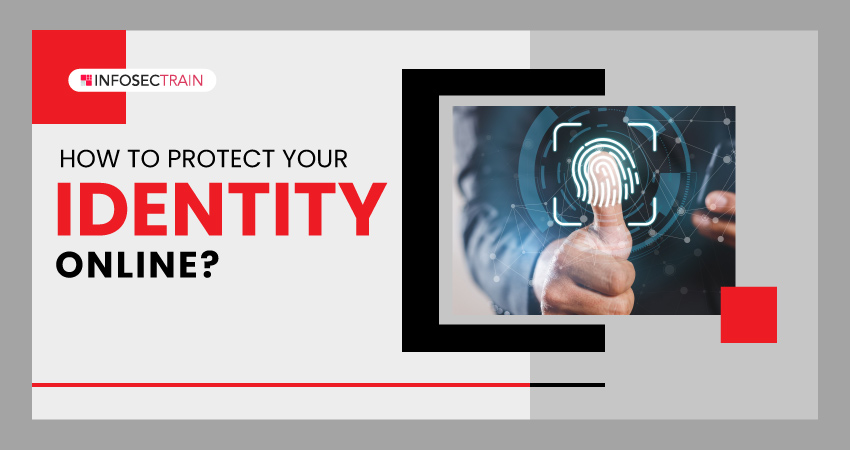How to Protect Your Identity Online?
Our online presence is more important than ever in today’s globally networked world. We have left digital footprints everywhere, from social media to online banking. There are a lot of positive aspects to living in the digital age, but there are also some risks, especially when it comes to keeping your identity safe online. Under several topics, this blog will discuss novel approaches to protecting your online identity.

1. Cyber hygiene: The digital shower for your identity
Just as you wouldn’t skip a shower to maintain personal hygiene, you shouldn’t neglect your cyber hygiene. Regularly updating passwords, enabling two-factor authentication, and keeping your software up to date are the basic steps to ensure that your digital identity stays squeaky clean.
2. Beware of phishermen: Hook, line, and scammer
Phishing attacks are like cunning fishermen waiting to lure unsuspecting victims into their net. To protect your identity, be cautious of unsolicited emails, messages, and links. Verify the sender’s identity, avoid clicking suspicious links, and never share sensitive information unless you’re certain of the source’s legitimacy.
3. The magic of passwords: Making them unbreakable
Creating a strong password is akin to crafting an unbreakable spell to guard your identity. Opt for lengthy, complex combinations of letters, numbers, and special characters. Better yet, consider using a reputable password manager to generate and store your passwords securely.
4. The social media tightrope: Balancing sharing and privacy
Navigating the world of social media can be like walking a tightrope. On one hand, sharing personal moments is enjoyable, but oversharing can lead to identity theft. Adjust your privacy settings to limit the audience for your posts and avoid sharing sensitive information such as your full birth date or address.
5. App permissions: Don’t grant access unnecessarily
Think of your smartphone as a digital fortress and every app you download as a potential gatekeeper. Review and limit app permissions, only granting access to the information necessary for their function. This reduces the risk of apps gathering more data about you than you’re comfortable with.
6. Virtual Private Networks (VPNs): The cloak of anonymity
VPNs are like invisibility cloaks in the digital realm. They encrypt your internet connection, making it difficult for prying eyes to spy on your online activities. Invest in a reputable VPN service to keep your identity hidden while browsing the web.
7. Patch the digital armor: Keep your software updated
Just as knights of old needed well-maintained armor, your digital devices require timely software updates. Software patches often include security fixes, so make it a habit to update your operating system, browsers, and apps regularly.
8. Password managers: The guardians of your digital keys
Password managers are your trusty sidekicks in the battle for online security. They not only generate and store complex passwords but also autofill them, saving you from the hassle of remembering numerous combinations.
9. Dark web awareness: Shine a light on hidden threats
The dark web is a murky underworld where stolen identities are bought and sold like contraband. Stay informed about data breaches, and consider using services that alert you if your information surfaces on the dark web.
10. Educate yourself: Knowledge is your shield
The most potent weapon in the quest to protect your online identity is knowledge. Stay vigilant about the latest cyber threats and security best practices. Attend webinars, read security blogs, and empower yourself with the information needed to stay one step ahead of cybercriminals.
11. Regular identity health checkups: Monitor your digital vital signs
Just as you visit a doctor for regular checkups, monitor your digital vital signs. Check your financial statements, credit reports, and online accounts for any unusual activity. Early detection of identity theft can minimize the damage.
12. Backup your digital existence: A safety net for identity crises
Data loss can be as traumatic as identity theft. Regularly backup your important files, documents, and photos to ensure you can recover your digital life in case of a cyber catastrophe.
Final words:
Protecting your identity online is not a one-time endeavor; it’s an ongoing commitment to digital self-preservation. By practicing good cyber hygiene, staying informed, and using tools like VPNs and password managers, you can fortify your digital fortress and enjoy the benefits of the digital world without exposing your identity to unnecessary risks. Remember, in the virtual realm, your vigilance is your greatest weapon against the forces of cybercrime.
InfosecTrain empowers individuals with expert-led cybersecurity training, equipping them with the competence to protect their digital identities and navigate the online world securely.



 1800-843-7890 (India)
1800-843-7890 (India) 
